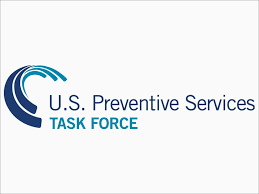
27 Jun USPSTF Issues Screening Guidelines for Anxiety and Depression in Adults
MedicalResearch.com Interview with:

Dr. Ogedegbe
Gbenga Ogedegbe, MD, MPH
Dr. Adolph & Margaret Berger Professor of Population Health
Director, Division of Health & Behavior
Director Center for Healthful Behavior Change
Department of Population Health
NYU Langone Health
NYU School of Medicine
Member of the U.S. Preventive Services Task Force
MedicalResearch.com: What is the background for this study?
Response: Depression and anxiety disorders are common mental health conditions affecting the lives of many adults in the U.S. The Task Force cares deeply about the health of people nationwide, so we reviewed the latest evidence on how best to support the mental health of adults in primary care.
MedicalResearch.com: What are the main findings?
Response: The evidence shows us that all adults should be screened for depression and those under 65 should also be screened for anxiety. These recommendations apply to everyone without signs or symptoms of depression or anxiety. We also strongly encourage anyone who has signs of depression or anxiety to talk with their clinician so that they can get the care they need.
MedicalResearch.com: What should readers take away from your report?
Response: Readers should know that it is important that everyone who does not have any signs or symptoms gets screened, since the evidence shows that their primary care clinician can help identify depression in all adults, including those who are pregnant and postpartum, and can help find anxiety in adults younger than 65.They should also know that a screening test alone is not enough to diagnose anxiety or depression. If a screening test is positive, a follow-up assessment will be needed to confirm that the patient has anxiety or depression. Lastly, healthcare professionals should be sure to provide appropriate care for anyone who expresses concerns about these conditions or reports symptoms.
MedicalResearch.com: What recommendations do you have for future research as a results of this study?
Response: The Task Force also looked to see whether screening could help identify those at risk for suicide and whether screening for anxiety is beneficial for older adults. Due to the lack of research in these important areas, we are calling for more research on the benefits and harms of screening for suicide risk in all adults and on screening for anxiety disorders in adults 65 and older. New evidence in these areas is critical to the mental health of people nationwide and should be an important priority for future study.
In addition, we need more research on ways to address barriers to mental health care. The Task Force recognizes that finding mental health services for adults can be difficult in some communities. We encourage clinicians to develop a trusting relationship with their patients, be aware of the stigma associated with mental health, and be sensitive to cultural issues to help overcome barriers to screening.
MedicalResearch.com: Is there anything else you would like to add? Any disclosures?
Response: Importantly, the evidence shows us that primary care professionals play a critical role in identifying mental health conditions so that people can be connected to the care they need. We hope that these recommendations can help bring awareness to the need for greater access to evidence-based mental health care for adults throughout the U.S.
Citations:
1)Final Recommendation Statement
Anxiety Disorders in Adults: Screening
https://www.uspreventiveservicestaskforce.org/uspstf/recommendation/anxiety-adults-screening
2) US Preventive Services Task Force. Screening for Anxiety Disorders in Adults: US Preventive Services Task Force Recommendation Statement. JAMA. 2023;329(24):2163–2170. doi:10.1001/jama.2023.9301
https://jamanetwork.com/journals/jama/fullarticle/2806250
3) Stein MB, Hill LL. Are There Reasons to Fear Anxiety Screening? JAMA. 2023;329(24):2132–2134. doi:10.1001/jama.2023.7239
https://jamanetwork.com/journals/jama/fullarticle/2806253
Editor’s note: This piece discusses mental health issues suicide. If you have experienced suicidal thoughts or have lost someone to suicide and want to seek help, you can contact the Crisis Text Line by texting “START” to 741-741 or call the Suicide Prevention Lifeline at 800-273-8255.
The information on MedicalResearch.com is provided for educational purposes only, and is in no way intended to diagnose, cure, or treat any medical or other condition. Always seek the advice of your physician or other qualified health and ask your doctor any questions you may have regarding a medical condition. In addition to all other limitations and disclaimers in this agreement, service provider and its third party providers disclaim any liability or loss in connection with the content provided on this website.
Last Updated on June 27, 2023 by Marie Benz
